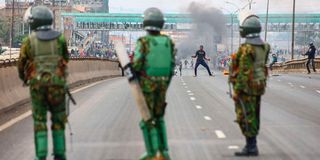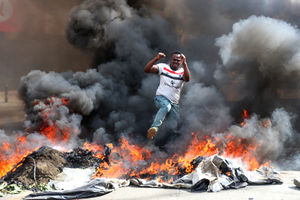
Anti-riot police officers keep an eye on demonstrators during Saba Saba protests at Roysambu roundabout on Thika Road in Nairobi on July 7, 2025.
Political rhetoric is feverish, militia are out burning property, police (who have orders to go for the legs, which are difficult to find in the tear-gas of riots) are shooting protesters and one would be tempted to conclude that the Armageddon is upon us.
Kenya faces a profound self-inflicted political and, potentially, national security crisis, which could lead to a serious series of tit-for-tat violence in parts of the country and is bad business all round. It is a good moment to observe and reflect on how, rather than continuing to dig, we can climb out of this hole.
In a recent article in Geeska.com shared by Charles Obbo on X, Abdi Ismail Samatar asked and answered a profound question: Why did African dictators and democrats fail where Asian dictators and democrats succeeded? Asia has industrialised and prospered, even countries which are as deprived, perhaps even worse off, than African ones, but Africa is headed in the opposite direction. Samatar answers his question in the very first paragraph.
From liberators to dictators
He says Asians prospered because of “strategic statecraft and visionary leadership” while African leaders just didn’t get it; “most African leaders did not understand the nature and structure of the colonial capitalist economy they inherited and why such a system was incapable of dynamic and expansive growth”; that the leaders “did not appreciate the need for qualitative restructuring of the inherited economy in order to open greater opportunities for the people to eradicate poverty and advance accumulation”.
He writes that some, like Jomo Kenyatta and his team, merely tinkered on the margins of the neocolonial state, becoming “political and economic kingpins” and “created a society where inequality and political tribalism are endemic” while Idi Amin “turned his ecological paradise into a horrid purgatory”.
He also talks about a “self-indulgent elite” and the desire by leaders to live as Big Men, without the rule of rule, concluding that “Many of the early post-independence leaders drifted from being liberators to dictators and election riggers”. It is particularly compelling writing and, while the bulk of it is not particularly new, to my mind, and at this moment in Kenya’s history, it is like a sad love song to a man with a broken heart. Every word, every string, every grunt of the bass, every whine of the rhythm, speaks to his particular, personal pain.
When I read about the attacks and burning of property in Central Kenya and saw the terrified posts of young people in Ruiru as they watched a militia arrive and deploy, and understanding as I suspect I do, the culture, lore and trauma of that region, I think a fundamental shift has taken place whose impact will echo down the years – and it’s not a good echo. The attack on the institutions of capitalism, in the midst of such poverty and daily struggle, and especially when the identity of the militia and its motive become clear with time, will have profound effect on the founding fiction of the Kenyan state.
Corruption and political tribalism
Can Kenya rise above violence, theft and corruption and political tribalism? Can it survive elite myopia?
Part of the answer lies in those people shouting in the street. There are between four and five million of them aged 18-25, driven, trainable, some already with world class skills, many increasingly tending towards innovation and self-employment. This is an army big enough, tough enough and with sufficient motivation to build a bridge to Mars. Can you imagine if these were the folks running offices and installations? Can you imagine if more of them had the capital and skills to set up businesses and factories?
Secondly, there is a good, diverse economy out there — the 6th largest in Africa with a GDP of $131.7 billion — good but mismanaged manufacturing base, very good financial service sector, reasonable info tech and vibrant agriculture but one which requires fundamental reform, as the man says, opening it up to more people and to facilitate accumulation. It has always been strangled by mismanagement and political corruption. Appointment to an economic management position is first and foremost driven by ethnic and political consideration, not necessarily vision and skill. And a lot of policy is rarely driven by economic soundness but by considerations of how it will play politically and the paths it opens up for corruption.
Finally, we often forget that, with the exception of the National Police Service, Kenya has a relatively professional and effective security sector though its orientation might need to change from protecting the state, a colonial legacy, to protecting the people. With adequate resources, less corruption and political tribalism, it is possible to have strong security institutions that project influence and protect interests.
Right now, rather than jumping off the cliff, Kenyans and their leaders should a step back and for once, rather than acting in the interest of their pockets or their tribal mates, give this place another chance.






